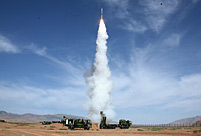Investments by foreign companies in the United States help create well-paid jobs and spur innovation in the world's largest economy, two American economists revealed in their latest book.
U.S. firms invest more in other countries than other countries do in the United States, but both types of investment provide enormous economic benefits to the United States, Theodore H. Moran, a nonresident senior fellow at the Washington-based Peterson Institute for International Economics (PIIE), said on Thursday.
Moran was speaking at a seminar releasing the book, which was jointly written with Lindsay Oldenski, an assistant professor at Georgetown University.
Based on U.S. government data, foreign investors in the United States pay higher wages on average than U.S. employers in a large array of industries, including manufacturing, wholesale trade, information services, finance and insurance.
"Any lingering fear that foreign investors might only locate inferior, low-wage jobs in the United States is demonstrably inaccurate," contended the two economists.
Between 1997 and 2009, sales, employment and wages, as well as research and development (R&D) spending in majority-owned affiliates of foreign firms in the United States, all increased.
Foreign firms' R&D spending in the United States was very strong and expanded even during the economic recession after the financial crisis, they claimed in the book.
Beyond job creation and R&D spending, foreign direct investment (FDI) has further economic implications.
When foreign firms enter a market, they bring new production technologies and management practices, which can have positive spillovers on the local market, said the two economists.
President of renowned think tank PIIE, Adam Posen, said any public discussions about FDI, whether inward or outward, are filled with emotional and misleading invocations of "economic patriotism" and "corporate responsibility," while this book responds to the current misplaced furore about FDI with sound analyses and constructive policy suggestions.
 Storms leave 97 dead, 58 missing in Mexico
Storms leave 97 dead, 58 missing in Mexico New model of indigenous surface-to-air missiles testfired
New model of indigenous surface-to-air missiles testfired  118.28-carat diamond to be auctioned in HK
118.28-carat diamond to be auctioned in HK Maternal love under streetlight
Maternal love under streetlight Naked foreign student sits in the middle of a road in Haikou
Naked foreign student sits in the middle of a road in Haikou  Colorful Yunnan: Enjoy the natural beauty
Colorful Yunnan: Enjoy the natural beauty Harbin named Chinese city with most beautiful women
Harbin named Chinese city with most beautiful women New college students' military training in Guangzhou
New college students' military training in Guangzhou Rugby girls
Rugby girls PLA's 38th Group Army conduct training
PLA's 38th Group Army conduct training Residences of the royal house of Savoy
Residences of the royal house of Savoy The last days of Wan Aihua
The last days of Wan Aihua Highlights at 12th National Games of China
Highlights at 12th National Games of China Beijing Film Academy welcomes freshmen
Beijing Film Academy welcomes freshmen 2013 Taiwan Int'l Tourism Expo kicks off in Taipei
2013 Taiwan Int'l Tourism Expo kicks off in TaipeiDay|Week|Month